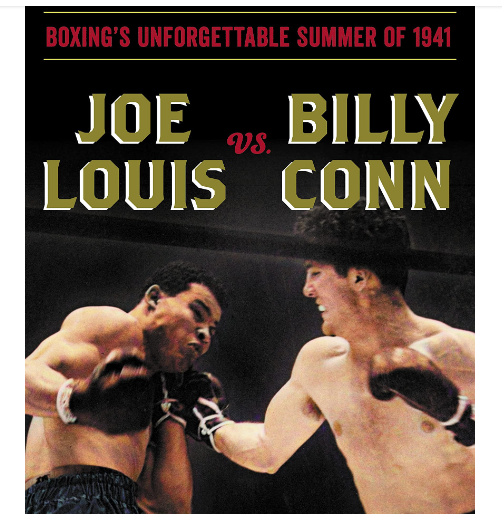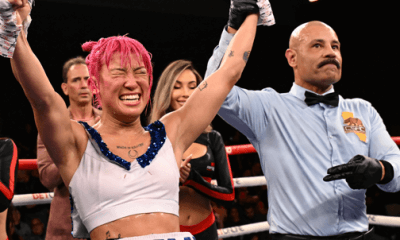Featured Articles
The Hauser Report: Literary, Medical, and Other Boxing Notes

The Hauser Report: Literary, Medical, and Other Boxing Notes
Joe Louis vs. Billy Conn by Ed Gruver (Lyons Press) is what its title says it is – a book about the June 18, 1941, heavyweight championship fight between Joe Louis and Billy Conn.
Conn was born and raised in Pittsburgh and grew up fighting. He liked to say that he started in alleys and worked his way up to the streets. He had his first pro fight at age sixteen, defeated five former world champions by age twenty, and was light-heavyweight champion of the world at 21. In a twist of fate, when a heavyweight prospect named Joe Louis fought Hans Birkie in Pittsburgh in 1935, Conn (then seventeen years old) handled the spit bucket in Louis’s corner.
Conn was 23 and Louis 28 when they fought in 1941. The weight differential between them was enormous. The challenger weighed in at 169 pounds (announced as 174). Louis tipped the scales at 204. Many expected the bout to be a replay of the 1921 “million-dollar-gate” encounter between Jack Dempsey and Georges Carpentier in which the hard-punching heavyweight champion obliterated his charismatic but smaller foe.
But Conn matched up well against Louis in two areas. His footwork was superior and his hands were faster.
More significantly, perhaps, The Brown Bomber was slipping a bit. Fighters got old at a young age in those days. And Louis hadn’t fought a top-level challenger since Max Schmeling in 1938, feasting instead on thirteen opponents referred to collectively by some sportswriters as the “bum of the month club.”
Louis was a 17-to-5 betting favorite over Conn. 54,487 fans packed the Polo Grounds in New York on fight night. They saw a great fight between two great fighters.
Scoring in New York in 1941 was on a round basis. Conn’s footwork and hand speed were dazzling. After twelve rounds, he led 7-4-1 and 7-5 on two scorecards and was even on the third. In the twelfth stanza, he staggered Louis. In today’s world, he would have been the new heavyweight champion. But championship fights in 1941 were fifteen rounds, not twelve.
Conn’s version of what happened next was, “In the twelfth round, I staggered Louis. It made me feel good. I knew I had the title if I wanted to box for it. But I thought how great it would be to beat the unbeatable Louis at his own game. I went into the thirteenth with the idea of knocking Joe cold.”
“Casting caution to the wind,” Gruver writes, “Conn went all out for glory. Operating on a knife’s edge, the Kid was extending a Homeric effort. If he succeeded, sportswriters would speak of his stunning victory in epic prose which would echo in eternity. There would be odes written in the Old World as well as in the new, paeans to Conn fighting with the passionate intensity of his Irish ancestors.”
But, Gruver continues, “trading blows with Joe Louis proved to be a bridge too far.” Louis froze Conn with a crushing right hand and, soon after, ended matters with thirteen unanswered blows.
Conn, Gruver recounts, “fell limply like a marionette whose strings had been cut” and struggled to regain his feet. But as the count reached ten, his gloves were still touching the canvas. The time of the stoppage was 2:58 of the thirteenth round.
Had Conn beaten the count, rounds fourteen and fifteen (if there was a fifteen) would likely have gone poorly for him. In all probability, Louis would have won by decision or knockout. Also, while much has been written about Conn going for the kill in round thirteen, Gruver acknowledges that, having fought twelve hard rounds, Conn might no longer have been physically able to maneuver out of harm’s way.
The Joe Louis lode has been mined by numerous authors (most notably, David Margolick, Don McRae, Randy Roberts, and Chris Mead). Conn was the subject of an excellent biography by Andrew O’Toole. Gruver’s work doesn’t have the texture or depth of analysis that these books offer. And he glosses over the endless dysfunctional family struggles that plagued Conn throughout his life culminating in the boxer’s sad decline into pugilistic dementia (which was particularly well covered by O’Toole).
There are also times when digressions interrupt Gruver’s narrative flow. The end of round six of one of the most exciting fights in boxing history isn’t the place to insert a three-page biography of Bill Corum (Don Dunphy’s radio commentating partner that night).
That said; Joe Louis vs. Billy Conn is an entertaining read. Gruver brings his subject to life. The fight itself is dramatically told over the course of five chapters. And Conn (who clearly has a place in Gruver’s heart) gets his due as a great fighter.
* * *
One of many divisive issues facing society today is the question of whether transgender athletes should be allowed to compete in a gender category other than that assigned to them at birth. Recently, Dr. Nitin Sethi (chief medical officer for the New York State Athletic Commission) offered some thoughts on the matter as it relates to combat sports.
Sethi supports transgender rights. He has pledged to protect transgender individuals against discrimination in employment, education, access to healthcare, and other areas of everyday life. But he is also, in his words, “committed to the value of fair competition.”
“A combat-sport bout,” Sethi states, “should occur between two equally matched competitors. At present, there is no consensus whether a bout between a transgender woman against a cisgender (biological) woman is a fair bout between two equally matched competitors.”
Metrics such as testosterone levels, Sethi notes, are inadequate to ensure fairness at the time of the bout. “It can be argued,” he posits, “that by the time a transgender woman combatant launches her professional career, she has already gone through male puberty, thus conferring her with the musculature and bony structure of a male. So, a transgender woman combatant may have an unfair advantage over her cisgender woman opponent.”
The converse would be true in the case of a fight between a transgender man and a cisgender man.
“Combat sports such as boxing,” Sethi continues, “are unique since every punch thrown at the head is thrown with the intention of winning by causing a knockout, which is a concussive head injury. These sports carry an exceedingly high risk for both acute and chronic neurological injuries.”
Thus, Sethi advocates for “two equally skilled and matched athletes competing on a level playing field and to keep matches fair, competitive, entertaining, and, most importantly, safe for all combatants.” At the present level of scientific knowledge, he concludes, allowing transgender athletes to compete in combat sports raises serious health and safety concerns that he finds unacceptable.
* * *
The Association of Ringside Physicians (ARP) says that its primary mission is to educate all persons involved in combat sports with regard to medical issues. This responsibility is of particular importance when it comes to the doctors themselves. In many jurisdictions, physicians with no combat sports experience evaluate fighter medical data, conduct pre-fight physicals, and are at ringside on fight night. And to be blunt about it, there are concerns that, in recent years, the ARP has fallen short in carrying out its educational mission.
Dr. Gerard Varlotta (a renowned orthopedic surgeon and sports medicine specialist who has served as a ringside physician for the New York State Athletic Commission since 1991) is seeking to educate. Toward that end, he has been the driving force behind a book titled Association of Ringside Physicians’ Manual of Combat Sports Medicine that will be published in early-September.
“I started thinking about the manual a decade ago,” Varlotta says. “The longer I worked as a ringside physician, the more I realized that most of us come from different backgrounds and have different training and there was no one place we could go to cross-learn about how to care for fighters. Boxing and MMA are complicated sports. There are a lot of nuances that need to be understood from a medical perspective. I began working on the project in earnest about three years ago. It has taken since then to get enough people with the right expertise to write the chapters, edit everything, and put it all together.”
No one picks up a Merck Medical Manual for pleasure reading. The same is true of this book. The manual consists of 53 essays authored and co-authored by 71 contributing writers. It’s 600 pages long and technical in nature.
That said; any doctor who takes on the role of being a ringside physician should study this book.
* * *
HBO Boxing is long gone, although fans can relive HBO fights on YouTube and other platforms. Meanwhile, Larry Merchant (who enjoyed a highly-praised career as a newspaperman before transitioning to television) will make an appearance next month in an unexpected theater.
On September 10, EPIX will televise Part 1 of an eight-part documentary entitled “NFL Icons.” The first episode paints a wonderful portrait of the immensely likable John Madden – a Hall of Fame coach and possibly the greatest expert analyst in any sport ever.
At one point, the documentary shows Madden facing the press after leading the Oakland Raiders to a 32-14 victory over the Minnesota Vikings in the 1977 Super Bowl. The first question comes from Merchant who inquires, “Coach, it looked like the halftime show could have given you a better game than the Vikings. How much stronger is the AFC than the NFC? You’ve dominated this game for five years.”
“I didn’t see the halftime show,” Madden answers.
“I don’t remember it,” Merchant told The Sweet Science when asked about the exchange this week. “But hearing about it from you now, I like it.”
Thomas Hauser’s email address is thomashauserwriter@gmail.com. His next book – In the Inner Sanctum: Behind the Scenes at Big Fights – will be published by the University of Arkansas Press this autumn. In 2004, the Boxing Writers Association of America honored Hauser with the Nat Fleischer Award for career excellence in boxing journalism. In 2019, he was selected for boxing’s highest honor – induction into the International Boxing Hall of Fame.
To comment on this story in the Fight Forum CLICK HERE
-

 Featured Articles4 weeks ago
Featured Articles4 weeks agoThe Hauser Report: Zayas-Garcia, Pacquiao, Usyk, and the NYSAC
-

 Featured Articles3 weeks ago
Featured Articles3 weeks agoOscar Duarte and Regis Prograis Prevail on an Action-Packed Fight Card in Chicago
-

 Featured Articles2 weeks ago
Featured Articles2 weeks agoThe Hauser Report: Cinematic and Literary Notes
-

 Book Review2 weeks ago
Book Review2 weeks agoMark Kriegel’s New Book About Mike Tyson is a Must-Read
-

 Featured Articles4 weeks ago
Featured Articles4 weeks agoRemembering Dwight Muhammad Qawi (1953-2025) and his Triumphant Return to Prison
-

 Featured Articles6 days ago
Featured Articles6 days agoMoses Itauma Continues his Rapid Rise; Steamrolls Dillian Whyte in Riyadh
-

 Featured Articles3 weeks ago
Featured Articles3 weeks agoRahaman Ali (1943-2025)
-

 Featured Articles3 weeks ago
Featured Articles3 weeks agoTop Rank Boxing is in Limbo, but that Hasn’t Benched Robert Garcia’s Up-and-Comers


















